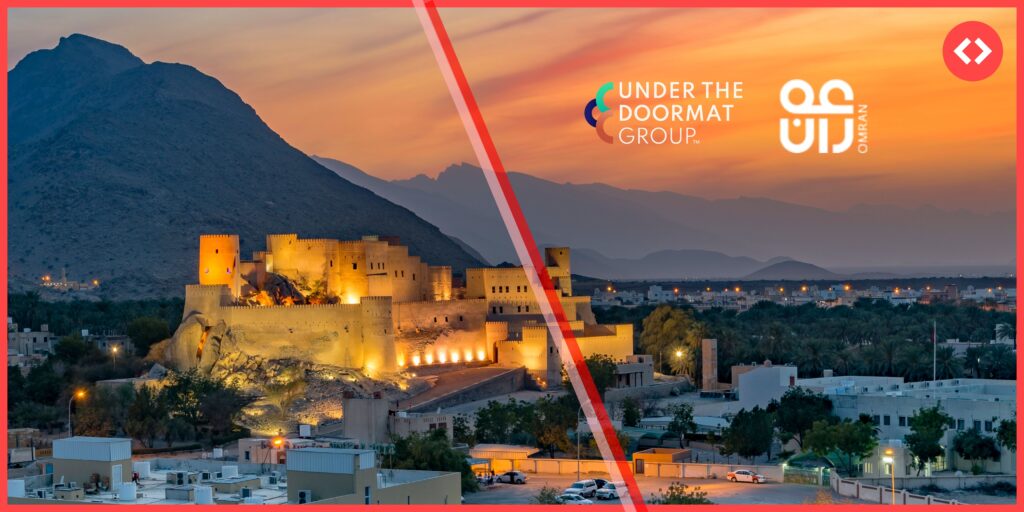If you’re a short-term rental manager in the Middle East, Europe, or the U.S., you’re used to hearing one narrative from governments: that our sector is a problem to be contained. Headlines often focus on restrictions, nightly caps, or pressure from hotel lobbies to limit vacation rentals.
That’s why the latest news out of Oman is so striking. For perhaps the first time, a sovereign wealth fund is investing directly in the short-term rental industry. And instead of clamping down, Oman is positioning STRs as part of the solution to achieving its long-term tourism ambitions.
The News: $7M Investment from OMRAN into UnderTheDoormat

UnderTheDoormat Group, the London-based short-term rental and proptech company, has secured a $7 million investment round led by Oman Tourism Development Company (OMRAN Group) — the Sultanate of Oman’s state-owned tourism company and a 100% subsidiary of the Oman Investment Authority. Existing investor Smedvig Capital also joined the round.
According to the company, the new capital will fuel global expansion across the Middle East and North America, enhance its technology platforms Hospiria and TrustedStays, and support the development of Oman’s newly legalized short-term rental market.
“This investment is a powerful catalyst for our continued global growth,” said Merilee Karr, Founder and CEO of UnderTheDoormat Group. “Building on the strong foundation we’ve established in Europe, we’re now accelerating our expansion across the Middle East and North America. From product innovation and AI-driven features to compliance tools and host support, we’re focused on delivering the technology infrastructure that will define the future of the short-term rental industry worldwide.”
Oman Short-Term Rentals: A Pro-Professional Model
What sets Oman apart isn’t just the money — it’s the regulatory philosophy. Rather than letting the market run unchecked, Oman has already introduced primary legislation for STRs and is rolling it out in three stages:
- Integrated Tourism Complexes (ITCs) — large, often government-linked real estate developments now eligible for five-year STR licenses.
- Professional operators and real estate companies managing multi-unit portfolios.
- Individual hosts — later on, but only if they can meet professional licensing and compliance standards.
In our exclusive Rental Scale-Up conversation, Merilee explained:
“What normally happens in major developments is they sell all the units to individual owners. And so you have lots of individual owners, some of whom are doing it professionally today. And what they want to do is allow all those individual owners to do it, but with one a professional management company to ensure standards for the whole development. And so that’s where, for example, Savills comes in… or SMEs who they want to grow in the market. The Ministry of Heritage and Tourism are incredibly ambitious about wanting to create SMEs. They want to create local jobs and they want a whole ecosystem of SMEs.”
For property managers, the message is clear: Oman isn’t just legalizing STRs, it’s actively designing the system to rely on professional operators and create space for local management companies to thrive. That’s a radically different starting point than in Europe or the U.S.
Real Estate and Tech Converge
The partnership also brings global real estate heavyweight Savills into short-term rentals in Oman, where it will handle on-the-ground operations . This kind of institutional participation shows that STRs are increasingly being treated as a core part of real estate investment and development strategy, not just a side hustle.
At the same time, the government isn’t just betting on operators — it’s betting on technology as the backbone. OMRAN’s investment followed a rigorous Earnst and Young (EY)-led due diligence process that validated Hospiria, UnderTheDoormat’s enterprise-grade PMS and distribution platform, as the infrastructure to scale STR supply legally and efficiently .
Merilee highlighted during our call how crucial this tech-enabled, multi-channel approach is in the Gulf:
“Everyone in the market wants to be on Booking.com as well as Airbnb. They were really excited because if they work with us and distribute through us and meet the right standards, we can also support them in getting onto Marriott Homes & Villas, Expedia, like all these other channels. They’re really savvy and they want to be multi-channel.”
The Takeaway for Property Managers
- Middle East opportunities: If you’re a property manager in Oman or neighboring markets, this is an open door. Governments are explicitly calling for professional management companies to lead the charge in building a new STR ecosystem.
- European & U.S. perspective: In contrast to restrictive regulatory trends at home, Oman is positioning STRs as a government-backed tourism growth engine. This is a signal of how late-adopting regions may structure their markets — with professionals, not hobbyists, in the driver’s seat.
- Tech as a prerequisite: With Hospiria validated by EY and chosen as Oman’s national STR tech partner, enterprise-grade PMS, compliance, and multi-channel distribution are no longer “nice-to-haves” — they are essential credentials for growth.
- A chance for SMEs: Oman’s framework doesn’t just allow STRs; it aims to foster small and medium-sized property management companies that can manage entire buildings or developments. For local entrepreneurs and international managers eyeing the region, this is a unique moment to establish new companies within a supportive legal framework.
- Industry-wide signal: This is not just about UnderTheDoormat. It’s a vote of confidence from sovereign wealth capital in the STR sector’s role in the global tourism economy.
As Merilee told us in our exclusive call with Rental Scale-Up:
“It’s a very good signal. We need positive things about these types of investments into our sector because I think it really does change the game in terms of, you know, always feeling like everybody’s against us. We are part of supporting tourism growth.”
Uvika Wahi is the Editor at RSU by PriceLabs, where she leads news coverage and analysis for professional short-term rental managers. She writes on Airbnb, Booking.com, Vrbo, regulations, and industry trends, helping managers make informed business decisions. Uvika also presents at global industry events such as SCALE, VITUR, and Direct Booking Success Summit.








